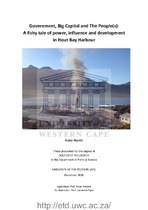Government, Big Capital and The People(s): A fishy tale of power, influence and development in Hout Bay Harbour
Abstract
The achievement of sustainable development requires the balanced interaction between
three components: the economy, environment, and society. Finding this balance in practice
requires a critical examination of the beliefs, systems, and institutions that govern decisionmaking.
Achieving sustainable development in reality thus involves understanding the
existing forms of power in a particular time and place – what they are, how they operate,
and how they influence decisions for development.
This study is an analysis of power in a specific case study: the Hout Bay harbour in Cape
Town, South Africa. Economic activities were driven by the fishing industry, in particular
Oceana, who operated and maintained a fishmeal factory in the harbour since 1958. While
the factory provided employment for the local coloured residents of Hangberg, it also
produced noxious odours and air pollution, leading to significant discontent from other
sectors of Hout Bay. A local and largely white activist group, Fresh Air for Hout Bay (FAHB),
challenged these operations on the basis of sustainability and this became a highly
contested issue. After years of debate and tension, the factory would eventually close in
2019, marking the end of an era for the fishing industry in Hout Bay.
The purpose of this study is to analyse the power dynamics in Hout Bay and determine how
these influenced the decisions around the factory. To do this, a qualitative autoethnographic
study was conducted using semi-structured interviews, participant observation, and
documentary review.
The power analysis found that those in power, particularly the City of Cape Town and

